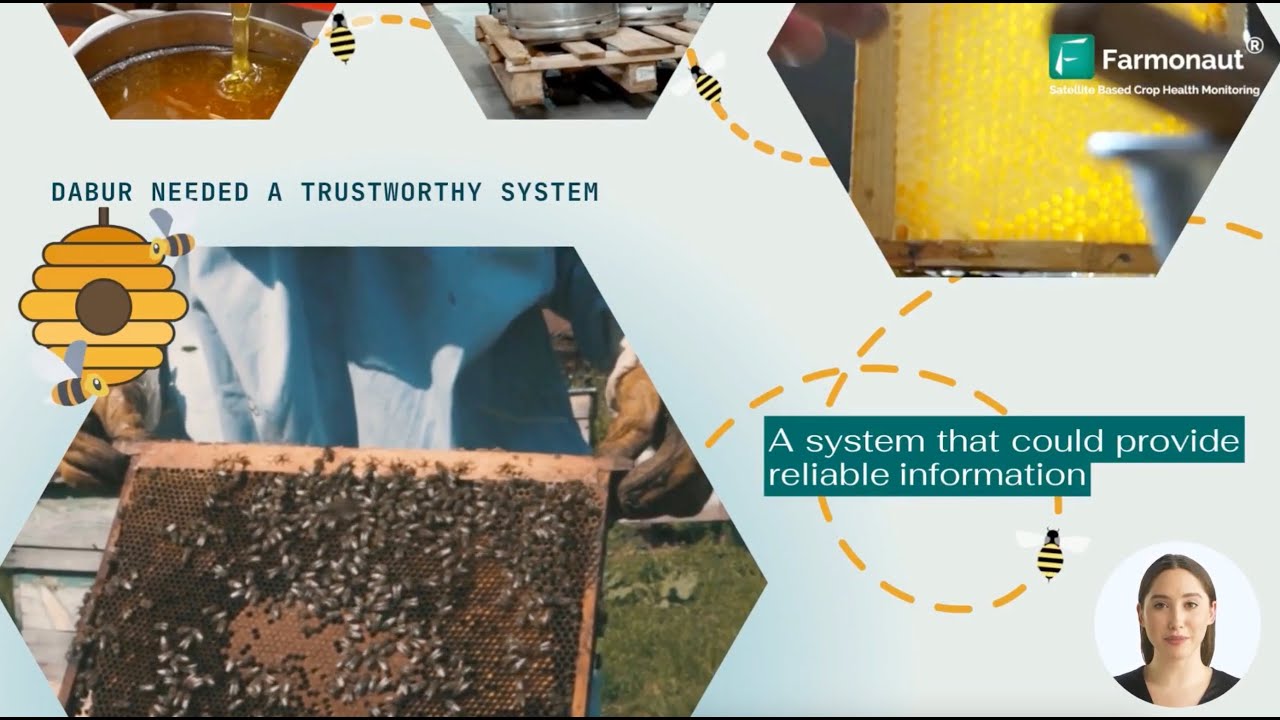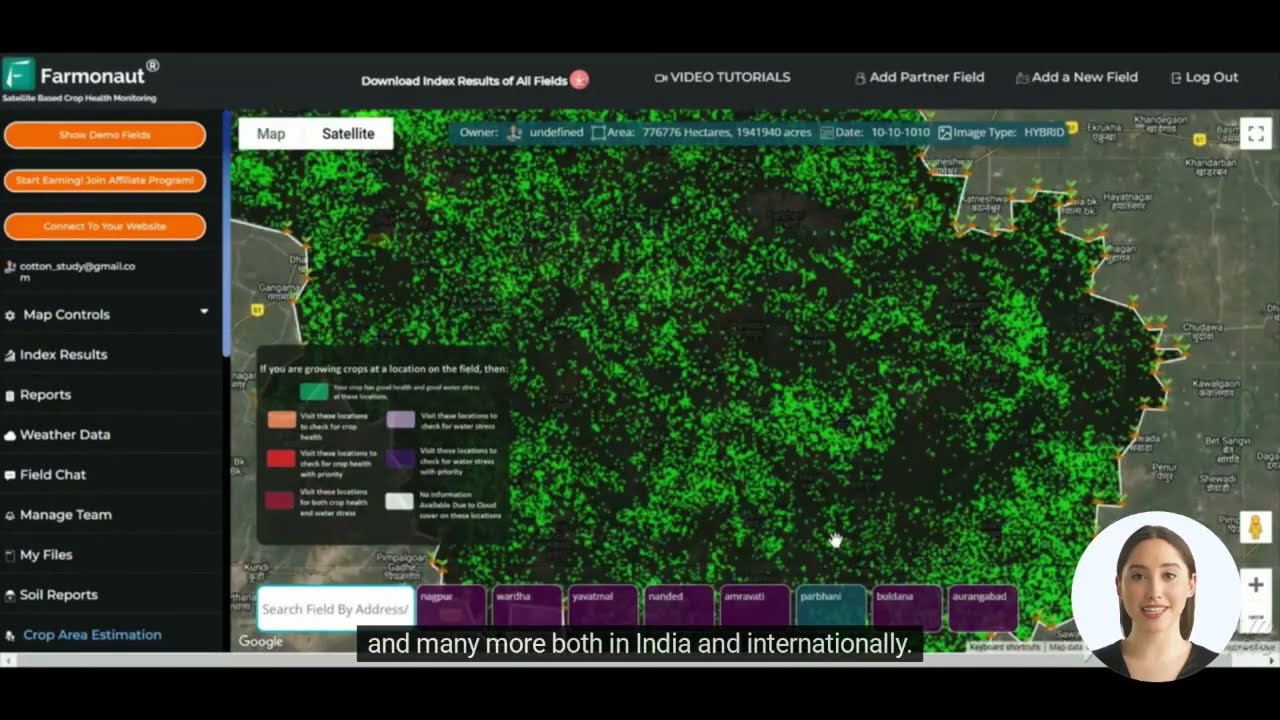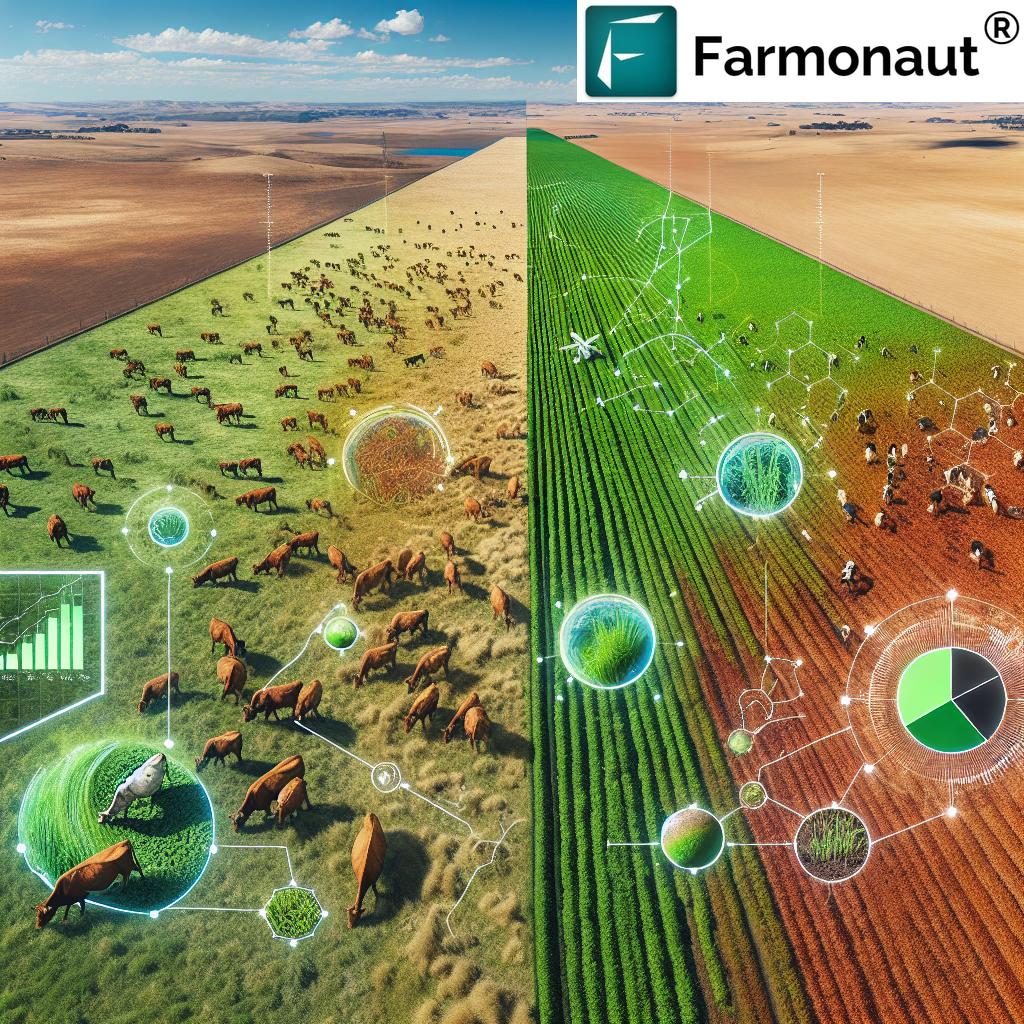Unlock Australia’s Beekeeping Potential: Expert Guide to Best Practices and Accredited Training

“Accredited beekeeping certification programs can increase honey production efficiency by up to 30% for new beekeepers.”
Welcome to our comprehensive guide on unlocking Australia’s beekeeping potential through expert practices and accredited training. As we delve into the world of apiculture, we’ll explore how innovative approaches and digital technologies are revolutionizing the beekeeping industry and shaping the future of agricultural training.
The Buzz About Beekeeping in Australia
Australia’s beekeeping industry is a vital component of our agricultural sector, contributing significantly to both honey production and crop pollination. With our vast and diverse landscapes, from the eucalyptus forests of Tasmania to the arid regions of Western Australia, our continent offers unique opportunities and challenges for beekeepers.
At Farmonaut, we recognize the importance of integrating traditional knowledge with cutting-edge technology to address the evolving needs of the rural workforce. Our mission is to empower beekeepers and agricultural professionals with the tools and knowledge they need to thrive in this dynamic field.
The Importance of Accredited Training in Beekeeping
Accredited beekeeping certification programs play a crucial role in developing a skilled and knowledgeable workforce. These programs ensure that beekeepers are equipped with the latest information on beekeeping best practices, safety protocols, and sustainable techniques. Let’s explore why accredited training is essential for both newcomers and experienced beekeepers:
- Standardized Knowledge: Accredited programs provide a consistent foundation of knowledge across the industry.
- Safety First: Proper training ensures adherence to beekeeping safety guidelines, protecting both beekeepers and their colonies.
- Sustainable Practices: Certification programs emphasize sustainable beekeeping techniques that benefit the environment and ensure long-term industry viability.
- Professional Development: Continuous learning opportunities keep beekeepers updated on the latest industry innovations and research findings.
To support the growth of professional beekeepers in Australia, we at Farmonaut are committed to providing digital training for agriculture that complements traditional hands-on experience. Our platform offers a range of agritech education resources designed to enhance skill acquisition and promote best practices in beekeeping.
Beekeeping Best Practices: Traditional vs. Modern Approaches
| Aspect | Traditional Method | Modern Approach |
|---|---|---|
| Hive Management | Manual inspection and record-keeping | IoT sensors for real-time hive monitoring and digital record-keeping |
| Pest Control | Visual inspection and chemical treatments | Sensor-based early detection systems and integrated pest management |
| Honey Harvesting | Manual extraction and processing | Automated extraction systems and quality control technology |
| Pollination Techniques | Natural pollination and basic crop placement | Precision pollination using GPS and crop-specific placement strategies |
| Queen Rearing | Natural selection and basic grafting | Genetic selection tools and advanced queen rearing techniques |
This table illustrates the significant advancements in beekeeping practices, highlighting how modern technologies are enhancing traditional methods. At Farmonaut, we believe in bridging the gap between these approaches, offering solutions that respect traditional wisdom while leveraging the power of innovation.
Sustainable Beekeeping Techniques for Australian Conditions
Australia’s unique climate and ecology require specialized beekeeping techniques. Our focus on sustainable beekeeping techniques is designed to help beekeepers thrive while preserving our delicate ecosystems. Here are some key practices we promote:
- Native Flora Integration: Encouraging the use of indigenous plants to support bee populations and produce unique honey varieties.
- Water Conservation: Implementing efficient watering systems to maintain hive health in arid regions.
- Pest Management: Utilizing natural and integrated pest management strategies to reduce reliance on chemicals.
- Genetic Diversity: Promoting the breeding of resilient, locally-adapted bee strains.
These practices not only benefit the bees but also contribute to the overall health of Australia’s agricultural sector. By adopting sustainable techniques, beekeepers can ensure the longevity of their operations while supporting biodiversity.

Agritech Education Resources for Modern Beekeepers
The integration of technology in beekeeping has opened up new avenues for education and skill development. At Farmonaut, we’re at the forefront of providing agritech education resources tailored for the beekeeping industry. Our digital platform offers:
- Interactive Learning Modules: Covering topics from basic hive management to advanced pollination techniques.
- Virtual Reality Simulations: Allowing beekeepers to practice handling techniques in a safe, virtual environment.
- Data Analysis Tools: Teaching beekeepers how to interpret hive data for improved decision-making.
- Community Forums: Facilitating knowledge sharing among beekeepers across Australia.
These resources are designed to complement traditional learning methods, providing beekeepers with a comprehensive educational experience that prepares them for the challenges of modern apiculture.
“Digital agricultural training platforms have shown to reduce skill acquisition time by 40% compared to traditional methods.”
Accredited Beekeeping Certification: Paving the Way for Professional Growth
Accredited beekeeping certification programs are essential for maintaining high standards in the industry. These programs cover a wide range of topics, including:
- Bee biology and behavior
- Hive management and maintenance
- Disease and pest control
- Honey production and processing
- Pollination services
- Business management for beekeepers
By completing an accredited certification program, beekeepers gain recognition for their skills and knowledge, opening up new opportunities for career advancement and business growth.
Agricultural Industry Innovation: The Role of Technology in Beekeeping
Agricultural industry innovation is transforming the way we approach beekeeping. At Farmonaut, we’re excited to be part of this revolution, offering cutting-edge solutions that enhance productivity and sustainability in apiculture. Some of the innovative technologies we’re integrating into our platform include:
- Satellite Imagery: For monitoring floral resources and planning pollination services.
- AI-Powered Pest Detection: Early identification of potential threats to hive health.
- Blockchain Traceability: Ensuring the authenticity and quality of honey products.
- Climate Modeling: Predicting nectar flows and optimizing hive placement.
These technologies not only improve efficiency but also contribute to the overall resilience of the beekeeping industry in the face of environmental challenges.
Rural Workforce Development: Empowering the Next Generation of Beekeepers
Rural workforce development is crucial for the future of Australian beekeeping. We’re committed to providing resources and support for aspiring beekeepers, particularly in rural and remote areas. Our initiatives include:
- Mentorship Programs: Connecting experienced beekeepers with newcomers to the industry.
- Rural Outreach: Bringing beekeeping education to remote communities through mobile training units.
- Youth Engagement: Collaborating with schools to introduce beekeeping as a viable career option.
- Women in Beekeeping: Supporting and empowering women to take on leadership roles in the industry.
By focusing on workforce development, we’re ensuring that the beekeeping industry remains vibrant and sustainable for generations to come.
Beekeeping Safety Guidelines: Protecting Beekeepers and Bees
Safety is paramount in beekeeping, and adhering to beekeeping safety guidelines is essential for both the welfare of beekeepers and the health of their colonies. Our comprehensive safety protocols cover:
- Personal Protective Equipment (PPE): Proper use of veils, gloves, and suits.
- Hive Inspection Techniques: Safe methods for opening and examining hives.
- Allergic Reaction Management: Recognizing and responding to bee sting allergies.
- Equipment Handling: Safe operation of smokers, extractors, and other tools.
- Environmental Awareness: Understanding and mitigating risks in various beekeeping environments.
By prioritizing safety, we create a secure environment that allows beekeepers to focus on their craft and contribute to the industry’s growth.
Digital Training for Agriculture: Revolutionizing Skill Acquisition
Digital training for agriculture is transforming the way beekeepers learn and develop their skills. At Farmonaut, we’re leveraging technology to create immersive and effective learning experiences. Our digital training platform offers:
- On-Demand Learning: Access to educational content anytime, anywhere.
- Adaptive Learning Paths: Personalized curricula based on individual skill levels and goals.
- Progress Tracking: Real-time feedback and performance assessment.
- Micro-Learning Modules: Bite-sized lessons for efficient skill acquisition.
By embracing digital training, we’re making education more accessible and tailored to the needs of modern beekeepers.
Agribusiness Skills Improvement: Beyond Beekeeping
Agribusiness skills improvement is essential for beekeepers looking to expand their operations or diversify their income streams. Our comprehensive training programs cover:
- Financial Management: Budgeting, pricing strategies, and investment planning.
- Marketing and Branding: Promoting honey products and pollination services.
- Supply Chain Management: Optimizing production and distribution processes.
- Regulatory Compliance: Navigating food safety and export regulations.
These skills empower beekeepers to run successful, sustainable businesses that contribute to Australia’s agricultural economy.
The Future of Beekeeping in Australia: Challenges and Opportunities
As we look to the future of beekeeping in Australia, we see both challenges and exciting opportunities. Some key areas of focus include:
- Climate Change Adaptation: Developing strategies to help bees and beekeepers thrive in changing environmental conditions.
- Biosecurity: Enhancing measures to protect Australian bees from exotic pests and diseases.
- Export Market Development: Expanding opportunities for Australian honey and bee products in international markets.
- Research and Innovation: Continuing to invest in scientific studies and technological advancements to support the industry.
At Farmonaut, we’re committed to supporting beekeepers as they navigate these challenges and seize new opportunities for growth and innovation.
Conclusion: Buzzing Towards a Brighter Future
The Australian beekeeping industry stands at the threshold of an exciting new era. By combining traditional wisdom with modern innovation, and by investing in accredited training and digital education, we’re paving the way for a sustainable and prosperous future for beekeepers across the country.
As we continue to unlock Australia’s beekeeping potential, we invite you to join us on this journey of discovery and growth. Whether you’re an experienced beekeeper looking to enhance your skills or a newcomer eager to explore the world of apiculture, there’s never been a better time to be part of this vibrant industry.
Remember, the future of beekeeping is in our hands. Let’s work together to create a buzzing, thriving industry that supports our agricultural sector, our environment, and our communities for generations to come.
FAQs
- Q: What are the benefits of accredited beekeeping certification?
A: Accredited certification ensures standardized knowledge, promotes safety, teaches sustainable practices, and offers professional development opportunities. - Q: How is technology changing the beekeeping industry in Australia?
A: Technology is revolutionizing beekeeping through innovations like IoT hive monitoring, AI-powered pest detection, blockchain traceability, and satellite imagery for resource planning. - Q: What sustainable beekeeping techniques are suitable for Australian conditions?
A: Sustainable techniques include integrating native flora, implementing water conservation methods, using natural pest management strategies, and promoting genetic diversity in bee populations. - Q: How can digital training benefit aspiring beekeepers?
A: Digital training offers flexible, on-demand learning, personalized curricula, real-time progress tracking, and efficient skill acquisition through micro-learning modules. - Q: What are some key challenges facing the Australian beekeeping industry?
A: Major challenges include adapting to climate change, maintaining biosecurity, developing export markets, and continuing research and innovation in the field.
Are you ready to take your beekeeping skills to the next level? Explore our range of digital tools and resources designed to support beekeepers of all levels. Click here to access our web app and start your journey towards becoming a master beekeeper today!
For developers interested in integrating our agricultural data into their own applications, check out our API and API Developer Docs.
Don’t forget to download our mobile apps for on-the-go access to all our beekeeping resources:




















